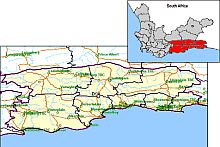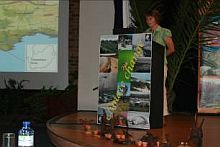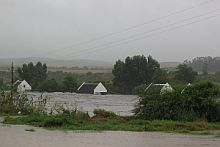The impact of climate change on the Southern Cape region
|
- Penny Price, Scientific and Support Officer, SAEON Egagasini Node
In February 2009, Eden District held a Climate Change Summit in Mossel Bay with “The impact of climate change on coastline and little Karoo living” as its theme.
The opening address was delivered by the Executive Mayor of the Eden District, Rudi Laws. In his keynote address, Dennis Laidler from the Western Cape Department of Environmental Affairs and Development Planning spoke about climate change, both globally and in the Western Cape specifically. He outlined the processes followed in developing the recently finalised Western Cape climate change response strategy and action plan.
Belinda Petrie, a consultant from One World Sustainable Investments who worked extensively on the Western Cape climate change response strategy, subsequently discussed the specifics of the strategy.
Penny Price from SAEON’s Egagasini Node gave a presentation on Flooding in the Eden District, which stretches from Swellendam in the west to just past Plettenberg Bay in the east and north to include Oudtshoorn and Ladismith (Figure 1).
Other speakers included Dr Peter Johnson from UCT’s Climate Systems Analysis Group, who gave an informative presentation on climate projections and how they are can be used and interpreted; Dr Wietsche Roets from Cape Nature, who discussed the potential impacts of climate change on estuarine and freshwater ecosystems; Dr Neville Sweijd from the CSIR, who gave a talk on marine systems and the environment with a focus on coastal management; Dr Guy Midgley from SANBI, who delivered a talk on climate change and biodiversity; Dr Larry Hutchings from Marine and Coastal Management, who integrated the impact of climate change on the complexity that the topic of marine fisheries embodies; and Prof Roland Schulze from the University of Kwazulu-Natal, who spoke on climate change and the South African water sector.
Climate change and sea level rise
In two separate but similar talks, Tandi Breetzke and Darryl Colenbrander dealt with KZN and Cape Town respectively with regard to climate change and sea level rise. Tandi presented on the work that has been done in KZN following the massive storm surges that hit and eroded their coastline recently. Darryl gave a presentation on the City of Cape Town’s sea level rise risk assessment and subsequent adaptation options. Both presentations highlighted the role the newly gazetted Integrated Coastal Management Bill will play in establishing and managing set-back lines for coastal development.
On the last day of the Summit, the Municipal Manager of Eden District, Godfrey Louw, read out a declaration containing actions identified as priority during the course of the conference. The mayors of the eight municipalities contained within Eden District signed this declaration in which they undertook to take the climate change agenda forward in their respective municipalities.
Science-society interface
The Summit fulfilled a valuable role in bringing together experts from within the various sectors and local level municipal workers, policy makers and implementers of policies at the local level. These are the people who have to deal with the consequences of climate change – the people who have to literally mop up after floods, fight fires, and save people stranded in high risk areas during extreme rainfall events.
The exchange of information between researchers studying the possible implications, trends and range of adaptation and mitigation strategies to climate change, and the people dealing with the consequences on the ground is vital to ensure an appropriate, efficient and adequate response to the challenges being faced, both now and in the future.





